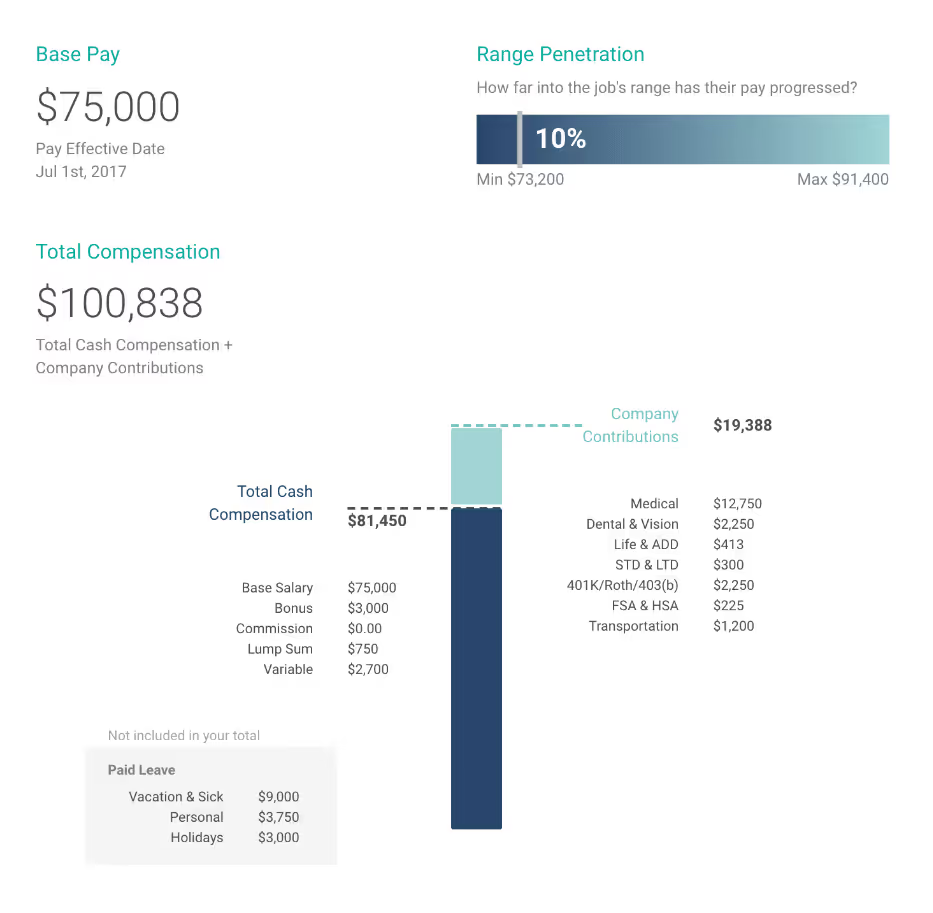In our last article What is Pay Communication and Why Does it Matter, we covered the risks of not having pay conversations (“higher pay” being the top reason people give for seeking employment outside of their current organization) and how improved pay communications can increase employee retention and reduce turnover rates. In this article, we are going to discuss some steps you can take immediately to improve pay communications — even if your organization isn’t used to talking about compensation.
1. Don’t Assume Managers Know How to Talk About Pay
It’s extremely common for organizations to assume that managers know how to have conversations about compensation with employees and that they will automatically do so as part of performance reviews. The truth is that many managers don’t get much training on how to be managers, which includes how to handle conversations about compensation with employees.Many people are promoted into manager level positions because they excel at what they do and the natural — or only — progression upward is to lead other people in how to do it. But excelling at a skill is different from teaching it. Teaching is also a different skill from people management. You also can’t assume that managers are familiar with compensation terminology. They may not know about pay ranges or how to talk about benefits and employee programs that make your company a great place to work. The degree to which managers are informed will, of course, depend on your level of pay transparency.Regardless, whether you need to create a special seminar or can bake it into formal training, pay communications is a necessary topic to cover with managers. Managers should learn when to have pay conversations, what to cover as part of those conversations, how much they are allowed to say about how compensation is determined at the organization, and which questions to pass to HR.
2. Be Able to Answer the Most Important Pay Questions
Whether it’s managers or HR leading pay communications, you need to be able to answer the two most important questions that employees tend to have about compensation:
- What does my position get paid?
- How do you determine that?
The answer to the first question is really about pay ranges. When employees ask this, they aren’t asking you to look up their paycheck. They want to know how the organization pays that position generally. Usually, the answer to this question is some kind of pay range, though whether you reveal this range to the employee depends on your level of pay transparency. The employee also wants to know how you decided that this range is appropriate and also how you determined where the employee falls in the range.If you don’t have a sophisticated, data-backed compensation rationale (using multiple sources), these questions can be difficult to answer and might seem dodgy to the employee. For example, there might be a pay equity problem with that employee’s position. Maybe one employee on the same team is paid well above everybody else, and also above market. The complaining employee heard about it and now they feel underpaid. That kind of thing happens when you don’t have a compensation strategy. If the underpaid employee is also in a protected class, such a minority or a woman, this kind of conversation can end up sparking a legal challenge to your pay practices.This is why using salary market data for your compensation planning is so important.
3. Review Salary History and Discuss Career Growth Opportunities
Most people care about compensation because they have life expenses as well as personal goals and professional goals that they are trying to meet. Don’t assume that employees who ask you to explain their compensation or ask for raises are greedy, ungrateful or delusional. It takes a lot of bravery for employees to bring up the subject. They’ve probably stewed about it a lot before doing so, but decided it was worth it because the cost of not doing so is extremely high.That being said, it’s common for employees to ask for too much or to have inaccurate information about what their position is worth. They may be looking at self-reported salary data from larger companies or different geographies or misunderstand the skills and responsibilities in a position with a similar sounding name to their own.The proper thing to do here is first review that employee’s salary history since they joined the company. This is respectful as it shows that you are familiar with this employee’s journey and in a position to coach them on the next steps of their career. You can review the amount of time that has passed since the employee last received a raise and discuss how they have grown in that time.Even if you can’t give the employee a raise or a promotion presently, this is a positive conversation, especially if you are able to instruct the employee on what they have to do to get to the next level in their career path. This is especially critical for individual contributors who are not asking to become managers but would like to grow their compensation as they learn more and become more effective at their jobs. For example, how does an entry level marketer become a mid-level marketer? Are there tiers for certain roles, like software developer 1, software developer 2, etc. and, if so, how do they get from tier to tier? If not, what are the options for growth?Often, this is the information that employees actually want most when they ask about compensation or inquire about a raise. If the answers they get are rational, honest, and offer a path upward that they feel they can achieve, the employee is more likely to feel valued and stay with your organization. This is an easy thing most organizations can do to improve pay communications.
4. Emphasize Total Compensation and Total Rewards Packages
Compensation isn’t all in the base pay. Make sure you discuss bonuses and incentive pay with employees and make sure they understand what they can control and what they can’t control in earning these rewards. This is particularly important for incentive compensation that may be harder to earn or dependent on overarching business results. Employees need to know what compensation they can count on versus what they have to really stretch to earn.Compensation also isn’t all cash, which is why you should also look at a total rewards statement that breaks down the entire compensation package. A lot of employees aren’t actually informed of the value that their employers are providing them through benefits, career development opportunities, education, recognition programs and other rewards. The total rewards package can be quite valuable, so it’s worth breaking it down to employees to improve pay communications.Employees typically respond favorably to communications about total rewards, especially when they are able to see the cash equivalent that employers contribute on healthcare benefits, retirement programs, and so on. It can be more than they thought and make them think twice about leaving for another opportunity.You should also decide when to communicate about total rewards and how often. For example, it makes sense to do this during the recruitment process when the employee is making their decision about whether to come work for you, but it might need to be re-emphasized during annual compensation reviews or off-cycle compensation reviews, or when changes to benefits and rewards are made.

5. Don’t Wait for Annual Increase Cycles to Talk About Pay
It’s very common for organizations to wait to talk about pay until there is an annual compensation review cycle, which might happen on an employee’s work anniversary or may happen for everyone around the same time each year (for organizations that have scheduled compensation reviews at all — some don’t).Standard annual compensation increases are usually between 0 and 5 percent, generally to keep up with inflation or based on market trends (what everybody else is doing). However, waiting for the annual compensation review cycle may be too long of a wait to retain top talent, especially if your organization is new to compensation planning, you are currently experiencing high turnover, or you have known flight risks.Annual base pay adjustments of 0 to 5 percent might also be insufficient for employees whose job descriptions have changed materially since the previous year or who have developed new compensable skills. You also have to think about salary compression and other causes of pay inequity. Finally, if you offer everyone the same increase when everyone has not performed equally, you can lose people who feel that their value has not been properly calculated. Whatever you decide to do, to improve pay communications, listen to employees and explain your rationale.In these scenarios, it makes sense to have pay communications more often or off-cycle as needed. This is especially effective if you can get to the employee before they have to ask about a raise — and before they start job hunting. If you know which employees are underpaid, you can have a check-in with them about their recent growth and glowing performance, lay out their total rewards package, and discuss how and when compensation adjustments can be made. Even if you can’t offer a merit-based raise or a promotion outside of the annual cycle, most people still feel better when pay has been communicated and they know what to expect when the time comes.
In Conclusion
For companies with a more traditional approach to HR, it makes sense to start with research on market salary data and train managers on the basics of how talk to employees about compensation — or schedule these conversations as a function of HR, especially if you have known flight risks. To improve pay communications, you just have to be intentional. The most critical thing is to end the silence. Every employee in your organization thinks about how they are compensated regularly. Most of the time, they just want to know that they are valued. They also want to know how to grow. What pay communications should accomplish — even in a traditional company — is an end to sudden, tense, rushed or reactive conversations about how employees are paid in favor of planned, strategic and transparent conversations about how employees are valued.For tips on how to further mature your compensation strategy and improve pay communications, check out our whitepaper: The Definitive Guide to Creating an Effective Pay Communications Plan.




.avif)
